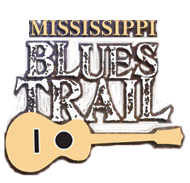Cotton Pickin’ Blues
Cotton Pickin’ Blues - Clarksdale
One of the major factors behind the “great migration” of African Americans from the South to northern cities was the mechanization of agriculture, which diminished the need for manual laborers. In 1944 the Hopson Planting Company produced the first crop of cotton to be entirely planted, harvested, and baled by machine. Blues pianist Joe Willie “Pinetop” Perkins was a tractor driver here at the time. He later played in the band of Muddy Waters and enjoyed a successful solo career.
Cotton and the blues are intimately connected, and one popular explanation for the predominance of blues in the Delta is the great concentration of African Americans whose labor was required for the cultivation of cotton here. Fieldhands who could play guitar or piano provided entertainment for other workers, and sometimes pursued music as a profession to get out of the backbreaking work in the fields. Blues performers have recalled making more money playing on Saturday nights than laborers would earn in a whole week.
Here at Hopson in the 1940s pianist Joe Willie “Pinetop” Perkins managed to keep a foot in both worlds, working as a tractor driver and as a professional entertainer. While living in the Delta Perkins worked in local jukes with artists including Lee Kizart and Robert Nighthawk, andperformed on the radio show King Biscuit Time with Sonny Boy Williamson No. 2 (Rice Miller)on KFFA in Helena, Arkansas. The live program was broadcast weekdays at 12:15 p.m. whenagricultural workers were at home eating lunch. Perkins, who remembered John Lee Hookersometimes playing here at Hopson, later taught Ike Turner to play piano.
According to military records Perkins was inducted into the Army in June of 1943, but he recalled that the plantation owners were able remove him from a bus of draftees, as tractor drivers were deemed essential to the war effort. Other bluesmen who served as tractor drivers during World War II included B.B. King, Son House, and Muddy Waters. As a tractor driver, Perkins played an important role in mechanization of cotton production, as the Hopson Planting Company was at the forefront of this transformation. From the ’20s through ’40s engineers from the International Harvester Company tested and developed tractor-mounted cotton pickers at Hopson. In 1944 they succeeded in harvesting a crop using only machines, and the technology was soon implemented across the South, resulting in changes including the replacement of the sharecropping system with wage labor andthe destruction of the abandoned homes of displaced workers.
Perkins left the Delta in the late ’40s, and worked for many years in bands with Earl Hooker, Muddy Waters, and others. He began returning to the Delta to perform after appearing at the first King Biscuit Blues Festival in Helena in 1986. He became a regular at the annual Helena festival as well as at Hopson, where an annual celebration was inaugurated in his honor in 2001. Perkins was also honored with a Mississippi Blues Trail marker in his hometown of Belzoni in 2008.
content © Mississippi Blues Commission
[ BACK TO TOP ]

